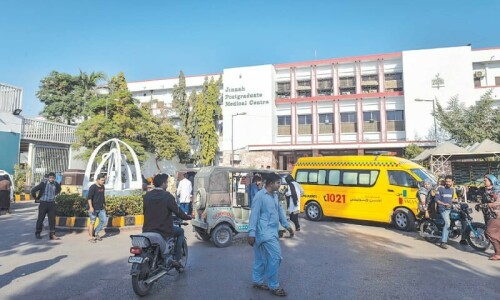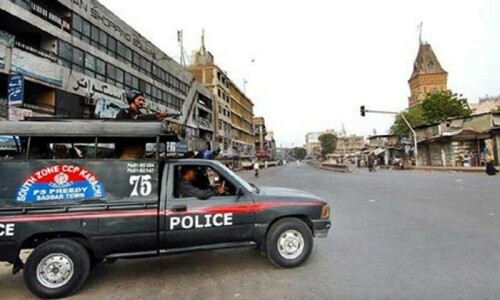KARACHI: Several recommendations and suggestions were gathered during a workshop on Thursday organised by Shehri-Citizens for a Better Environment (CBE) in collaboration with the office of Friedrich Naumann Foundation (FNF) Pakistan for their three-year project ‘Climate Efficient Urban Mobility and Smart City Growth’ initiated last year.
“Our city is already gridlocked and climate change is also affecting our health,” said Amber Alibhai, general secretary of Shehri-CBE. “If our government has woken up to this and plans [to do] something about it with a focus on the next 30 years or so, would it even be enough?,” she said adding that whereas there used to be just the man of the house leaving home each day, there is also the woman of the house going out for work and the children too for their school, etc.
“And they all face mobility issues. Even the physically-challenged persons are no longer sitting at home and they too have their problems of mobility. There are things such as private vehicles, public transport, roads, pavements and their condition to consider too when we talk about urban mobility,” she said, adding that it was all also linked with environment issues and climate change.
“There are also the banks making it easy to lease out more cars, adding to traffic congestion. Also, how many private cars will go off road for each bus which comes out? We need to think about all these things when we talk of BRTs [bus rapid transit systems].” she asked.
Aamir Amjad, senior programme manager with FNF, said that there was a lack of planning for urban mobility. “Issues of traffic and other citizenship problems are not discussed at schools here, but they should be so that people can think about such things,” he said.
In his presentation ‘Climate change and transportation — need for a holistic sector-based vision’, urban planner and project manager Farhan Anwar said that it was required to have a more holistic vision when thinking about urban mobility. “We are talking about the mobility of humans and not transport. It is not just about carbon emissions. We need to look at the larger picture here,” he said.
“When thinking land use development, it is important to start with the pedestrian. Being the most vulnerable on the road, the pedestrian is your VIP, but it looks [like] no one even sees pedestrians,” he pointed out.
Sharing some targets set by the World Bank, he said that they wanted to see the demand for motorised transport activity reduced through appropriately designed urban places, promote the use of low-emission transport modes such as walking or cycling and public transport and use the most efficient fuel-vehicle technology system possible for all trips.
He said that inclusivity and economic revitalisation were the two things needed for sustainable urban mobility which went a long way in improving the quality of life. “Quality of life can relate to the comforts and conveniences that will be provided to the users through improved accessibility, which will lead to reduction in physical and psychological stresses, livelihood improvement, and increased sociability with activities like walking and cycling contributing to improved health and well-being of people,” he said, while pointing out how the environment could be helped.
“Economic revitalisation will happen as improved access can lead to improved land use and economic activities,” he said.
“Inclusivity will enhance as mobility would be ensured for all irrespective of their gender, physical mobility or socio-economic status and not just within the modes of transport, their access would also be facilitated in urban spaces,” he added.
Ashraf Lakho, chief consultant, Sindh Mass Transit Authority, said that the government had been following research and surveys conducted by the Japan International Cooperation Agency (JICA) several years ago with eyes closed. “The JICA master plan was for 2013 and it is 2019 now. Why are we following it now?” he said.
Sophia Hasnain, founder and CEO of Linked Things stressed on data-driven development. Dr Syed Jamil Kazmi spoke about how habits of people have impacted the weather.
Published in Dawn, February 15th, 2019













































Dear visitor, the comments section is undergoing an overhaul and will return soon.